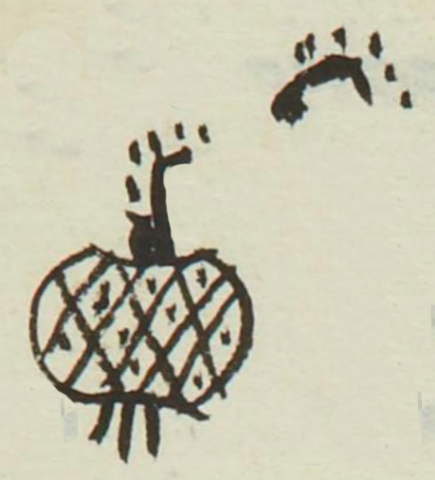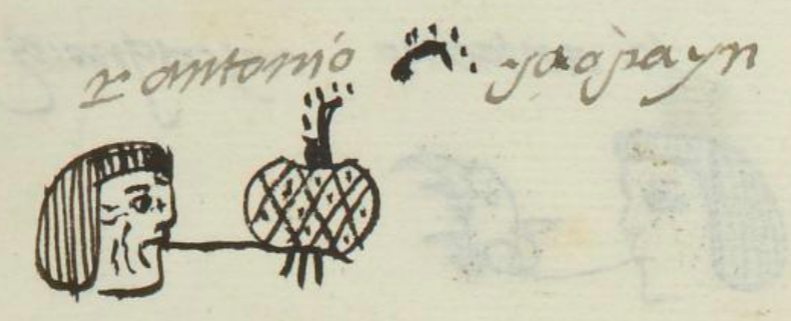Yaopain (MH522r)
This black-line drawing of the compound glyph for the personal name Yaopain ("The Combatant Ran Fast," attested here as a man's name) shows a bird's eye view of a war shield in the guise of a turtle (ayotl), which is a near homophone with yaotl. The turtle shell has a diamond pattern with dots. Yaotl is a common name that means enemy, and it is a near homonym with ayotl. Two black footprints go (apparently running, from "to run fast," (paina)) upward from the shield. The footprints are also shown in a bird's eye view.
Stephanie Wood
The Matrícula de Huexotzinco has many examples of this ayotl-for-yaotl glyph. It has been studied by Lisardo Pérez Lugones in the book El Arte de Escribir (2018).
Also worth noting is the design of the carapace here. James Maffie (personal communication, 3/4/2025) reports: "Lois Martin...argues that the dotted diamond pattern so common on Maya depictions of turtle carapaces is identified by Sahagún as axochiatl ('water flower' or primrose). She argues that the dotted diamond lattice pattern refers to ripe maize. Irmgard Johnson and Diana Ryesky report that motifs consisting of small dotted diamonds are called maizitos on the mantas coloradas woven in Oaxaca. (203) Chantal Huckert identifies a similar pattern on contemporary Tlaxcalan embroidered blouses as 'representations of maize kernels and their dimples on the corn cob.' (203) When the kernels of maize ears begin to dimple, farmers know that the maize is sufficiently dry to be harvested and stored without spoilage. This condition is represented by the dots on the pates of the human-head maize ears depicted on the Templo Rojo mural of Cacaxtla, for example." [See: Lois Martin,“The Axochiatl Pattern: Aztec Science, Legitimacy, and Cross-Dressing,” in Visual Culture of the Ancient Americas: Contemporary Perspectives, Andrew Finegold and Ellen Hoobler (eds). Norman: University of Oklahoma Press, 2017, pp. 197-208.]
Stephanie Wood
antonio yaopayn
Antonio Pain
Stephanie Wood
1560
Stephanie Wood
shields, escudos, enemies, enemigos, running, corriendo, run fast, correr rápido, tortugas, nombres de hombres

yao(tl), enemy, https://nahuatl.wired-humanities.org/content/yaotl
yaoyo(tl), warfare, https://nahuatl.wired-humanities.org/content/yaoyotl
paina, to run fast, https://nahuatl.wired-humanities.org/content/paina
Matrícula de Huexotzinco, folio 522r, World Digital Library.
https://www.loc.gov/resource/gdcwdl.wdl_15282/?sp=123&st=image
This manuscript is hosted by the Library of Congress and the World Digital Library; used here with the Creative Commons, “Attribution-NonCommercial-ShareAlike 3.0 License” (CC-BY-NC-SAq 3.0).






